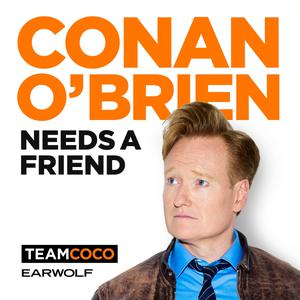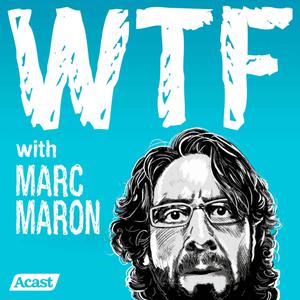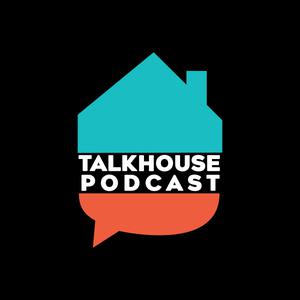
Rivals: Music's Greatest Feuds
iHeartPodcasts
Beatles vs. Stones. Biggie vs. Tupac. Kanye vs. Taylor. Who do you choose? And what does that say about you? Actually, what do these endlessly argued-about pop music rivalries say about us? Music opinions bring out passionate debate in people, and music journalists/critics Steven Hyden and Jordan Runtagh know this firsthand. They’re both obsessed with the biggest (as well as the most obscure) rivalries in music history. Each week, they’ll break down the details of a different colorful feud, and attempt to figure out why many of our favorite pop and rock stars can’t seem to get along.
- 2 minutes 26 seconds'Off the Record: David Bowie' — Trailer
The series premiere of 'Off the Record' explores the life — or, rather, lives — of David Bowie by examining each of his iconic personas. Major Tom. Ziggy Stardust. Aladdin Sane. The Thin White Duke. Taken collectively, these faces form a portrait of a one-of-a-kind rock legend. Follow his transformation from lonely London boy struggling to find his way in the Swinging Sixties to cultural innovator, whose relentless drive and daring nearly destroyed him. You know the songs, now meet the man. The 11-part season begins Monday, January 18th!
Learn more about your ad-choices at https://www.iheartpodcastnetwork.comSee omnystudio.com/listener for privacy information.
2 February 2021, 5:21 pm - 53 minutes 25 secondsSuspicious Minds: Elvis Presley vs. Jerry Lee Lewis
Elvis Presley was the man to beat when Jerry Lee Lewis made the drive from small-town Louisiana to Memphis in 1956. The piano punisher had come for the King of Rock’s crown and was determined to show him up at every turn. Jerry Lee scored a deal on Elvis’ onetime label, employed the same management, and even some of the same songwriters. The pair duked it out in the charts in the late ‘50s, but the image conscious Elvis remained a much bigger crossover star than Jerry Lee, who relished his role as an uncompromising bad boy. When Elvis received his draft notice, Jerry Lee seemed poised to take over as rock’s leading voice. Then it all came crashing down as his troubling private life became public. Exiled from the rock ’n’ roll spotlight, Jerry Lee spent much of the ‘60s playing honky tonk dives and slowly rebuilding his musical career. Meanwhile, Elvis effectively abdicated his throne, trading electrifying singles for well-paying yet vapid films. Both men emerged from the wilderness by the end of the decade, spurring each other’s musical efforts. There was a begrudging respect between them, but Jerry Lee’s aggression sometimes got the best of him — like the time he showed up at Presley’s Graceland estate late one night with a gun. They didn’t call him “The Killer” for nothing.
Learn more about your ad-choices at https://www.iheartpodcastnetwork.comSee omnystudio.com/listener for privacy information.
27 January 2021, 5:00 am - 53 minutes 5 secondsTheir Greatest Feuds (David Geffen): The Eagles Part 3
Our series on The Eagles concludes with a look at the business dealings and lawsuits that took place behind the scenes and the man who helped to shape their early career, David Geffen. A Brooklyn kid whose mother called him King David, Geffen moved to L.A. in the sixties and swiftly became a mover and shaker. By the time he met The Eagles, he was a kingmaker in the local rock scene. But as The Eagles themselves became kings, their relationship with Geffen soured, setting the stage for Geffen's protege, Irving Azoff, to swoop in and become their new manager.
Learn more about your ad-choices at https://www.iheartpodcastnetwork.comSee omnystudio.com/listener for privacy information.
20 January 2021, 5:00 am - 56 minutes 38 secondsTheir Greatest Feuds (1976-2001): The Eagles Part 2
Our special series on The Eagles continues with their post-"Hotel California" years, in which the band was more popular than ever, selling one million albums per month while also falling apart. There was tension between the band's twin leaders, Don Henley and Glenn Frey, who fought for control of The Eagles. But most of the ire was focused around Don Felder, the talented guitarist who wrote the music for the song "Hotel California." This carried over to the band's reunion years in the 1990s, when they were making more money than ever. Felder resented Henley and Frey for not giving him equal say in the band, creating tension that resulted in his firing in 2001.
Learn more about your ad-choices at https://www.iheartpodcastnetwork.comSee omnystudio.com/listener for privacy information.
13 January 2021, 5:00 am - 51 minutes 34 secondsTheir Greatest Feuds (1971-75): The Eagles Part 1
Welcome to our epic three-part series on all of the beefs, feuds, and simmering resentments that occurred inside one of the most successful bands in history, The Eagles. In part one, we cover the band's early years, which included multiple battles inside the band and out. First, there was the feud with Glyn Johns, the super producer known for working with the best British bands of the era who resisted Glenn Frey's urge to rock. Then there was Bernie Leadon, the genius instrumentalist who couldn't help but pour a beer on Glenn's head. And then there's sweet Randy Meisner, who was driven out of The Eagles because he wasn't "alpha." As an added bonus, we also cover The Eagles vs. Rolling Stone softball game. Yeah, that actually happened!
Learn more about your ad-choices at https://www.iheartpodcastnetwork.comSee omnystudio.com/listener for privacy information.
6 January 2021, 5:00 am - 49 minutes 23 secondsChronic Issues: Dr. Dre vs. Eazy-E
Back in the late 1980s, Dr. Dre and Eazy-E were members of N.W.A., one of the most important and iconic hip-hop groups ever. But in the wake of their historic 1988 album Straight Outta Compton, the two fell out over business disagreements. Once Dre went solo, he proceeded to rip Eazy apart on diss tracks prominently featured on his blockbuster LP The Chronic, forever fixing Eazy in the eyes of millions of pop fans as the clownish "Sleazy-E." A few years after that, however, Eazy tragically died at a young age, and Dre proceeded to recontextualize his relationship with Eazy, making it seem as though they never beefed bitterly at all.
Learn more about your ad-choices at https://www.iheartpodcastnetwork.comSee omnystudio.com/listener for privacy information.
30 December 2020, 5:00 am - 52 minutes 59 secondsBritpop Battle: Oasis vs. Blur
This is an especially personal one for Steve — back when he was a Britpop-loving teen in the nineties, this was one of the first rock rivalries that he cared about. Which is odd, because in America, nobody really cared about Oasis vs. Blur the way people did in England, where they were the two biggest bands in the land. Blur were the knowing chroniclers of posh British society, and Oasis was the scrappy pub-rock band of the working class. While Blur was actually supportive of Oasis early on, Oasis looked at Blur as an impediment on their road to world domination, and proceeded to mercilessly bully them in public. In time, Oasis would come to massively overshadow Blur in terms of commercial success, though Blur's frontman Damon Albarn ultimately had a more lasting career outside of the band.
Learn more about your ad-choices at https://www.iheartpodcastnetwork.comSee omnystudio.com/listener for privacy information.
23 December 2020, 5:00 am - 54 minutes 34 secondsKill 'Em All: Metallica vs. Megadeth
Before there was Megadeth, Dave Mustaine was the guitarist in a promising San Francisco thrash metal band called Metallica. And then he was fired for being an obnoxious drunk, a slight compounded by the fact that all the other members of Metallica were also obnoxious drunks. From then on, Mustaine was obsessed with getting his revenge, and he formed Megadeth with the purpose of dethroning Metallica from the top of the thrash metal heap. Alas, it proved difficult to compete with the most successful metal band in history. No matter what Mustaine did, he was destined for second place.
Learn more about your ad-choices at https://www.iheartpodcastnetwork.comSee omnystudio.com/listener for privacy information.
16 December 2020, 5:00 am - 58 minutes 46 secondsWhite Heat: Lou Reed vs. John Cale
Two burgeoning musical geniuses came together in the mid-60s to form the Velvet Underground, a group that expanded the definition of what a rock band could be. Lou Reed’s literary ambitions led him to craft lyrics steeped in the gritty language of the streets, while John Cale called upon his background in the avant garde music scene of downtown Manhattan. Their unique talents coalesced on tracks like “Venus in Furs,” “Sister Ray,” and “Heroin,” groundbreaking songs that laid the groundwork for punk, art-rock, and many other genres to come. The Velvet Underground’s historical influence cannot be overstated, but their lack of commercial success led to heightened tensions in the group. Reed felt his dominance challenged by Cale’s musical virtuosity and forced him out of the band, which would never achieve the same level of musical daring. Their prolific solo careers in the ’70s and beyond bore traces of their ex-partner, as Reed sought to bolster his artistic credentials with noise experiments, while Cale developed his gift for melody and song craft. Ultimately, it was the unexpected death of their estranged one-time benefactor, Andy Warhol, that brought the pair back together to make peace with themselves, their troubled history, and their towering musical legacy.
Learn more about your ad-choices at https://www.iheartpodcastnetwork.comSee omnystudio.com/listener for privacy information.
9 December 2020, 5:00 am - 1 hour 2 minutesBad Cops: Sting vs. The Police
In the 1980s, the biggest rock band in the world was The Police. While all three members were blonde and good-looking, they were hardly a conventional success story. The Police was a supposed punk band composed of a prog-rock drummer, a jazzy bassist, and a guitarist who was pushing 40. But their unique chemistry (as well as Sting's trove of catchy pop songs) made them among the first acts to really break out during the MTV era. As they gained in popularity, however, they also grew to despise each other more and more, especially as Sting sought to take complete control of the band. As a result, they became the rare band to break up at the height of their popularity, though the members would remain frenemies for years afterward.
Learn more about your ad-choices at https://www.iheartpodcastnetwork.comSee omnystudio.com/listener for privacy information.
2 December 2020, 5:00 am - 56 minutes 34 secondsAntichrist Superstars: Trent Reznor vs. Marilyn Manson
In the mid-'90s, no two rock stars struck more fear into the hearts of parents than Trent Reznor and Marilyn Manson. These toxic twins started out having a teacher-student dynamic, with Reznor guiding Manson musically to stardom. But Manson's shock-rock antics soon overshadowed his mentor, who was hard at work for years trying to finish his masterwork "The Fragile." In time, Reznor would come to see Manson as a "dopey clown" while Manson seethed about Reznor literally losing the master recording to his early albums.
Learn more about your ad-choices at https://www.iheartpodcastnetwork.comSee omnystudio.com/listener for privacy information.
25 November 2020, 5:00 am - More Episodes? Get the App
Your feedback is valuable to us. Should you encounter any bugs, glitches, lack of functionality or other problems, please email us on [email protected] or join Moon.FM Telegram Group where you can talk directly to the dev team who are happy to answer any queries.
 Rolling Stone Music Now
Rolling Stone Music Now
 Conan O’Brien Needs A Friend
Conan O’Brien Needs A Friend
 Pod Yourself A Gun - A Rewatch Podcast
Pod Yourself A Gun - A Rewatch Podcast
 Indiecast
Indiecast
 WTF with Marc Maron Podcast
WTF with Marc Maron Podcast
 Talkhouse Podcast
Talkhouse Podcast